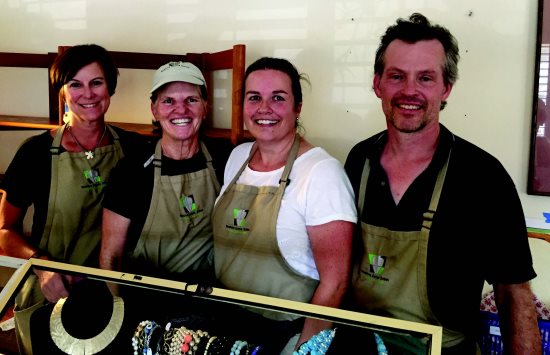
| ||||||
A handful of baby boomers wandered the common rooms and garage searching for something of value. One man's excess is often another man's - or woman's - treasure. Nowhere is this more obvious than at an estate sale.
The season was just heating up but Hazel Kravariotis, of Senior Sorters & Estate Liquidators was booked two months out. Kravariotis and her coworkers spent four sales hours Friday and again Saturday overseeing that particular event, but before the doors even swung open they were already on the clock to make the sale most beneficial for dual clients - the family who hired them and the customers, both collectible dealers and private citizens who frequent these events.
Clearing clutter. Downsizing. Transitioning to senior housing. Dispersing a deceased loved one's lifetime possessions. Those are all possible reasons for holding an estate sale. It can be overwhelming to dispense with the "stuff" accumulated during someone's lifetime. While a yard or garage sale may be manageable minus professional help, an estate sale is generally of broader scope and therefore more complex.
Kravariotis explains that most families go through such a thorough liquidation process only once or twice in a lifetime. It is comprehensive in scope, and company and customer both hope everything goes - from laundry detergent to tea towels, lamps, video games and music, furniture, fine art and flashlights.
What doesn't sell is generally passed on to charities. Vicky Kearsey runs her Beehive Estate Sales company with an eye toward reusing, recycling and repurposing; she explains that incurring more than a few hundred dollars in hauling fees on leftover items means she has not done a good job liquidating the estate.
When Lamorinda Weekly caught up with a Beehive sale it was the dog days of late summer - so hot that Kearsey actually saw their customer base erode slightly. Those who braved the triple digit heat found furniture, paintings, bedding, fine china - even a stair lift chair for sale.
The latter was the company's first such item to be sold and it did sell.
Kearsey says other medical aids for seniors - canes and walkers, for example, are always popular items. She and her crew work six days a week to prep and hold a single estate sale, starting with an appraiser visit mid-week. Then Kearsey personally goes through every drawer in every room to ferret out any hidden treasurers, such as money, coins or passports, perhaps, before sending staff in to process the room.
Prior to one estate sale three volunteers discovered a U.S. flag with only 48 stars. They deemed it "faulty," not realizing it was instead a collectible item. Then "everything is priced," Kearsey says. Her company has even sold light fixtures and at least one porcelain sink.
Estate sales companies are commission based; most expect to gross a minimum amount before they will accept a job. Kravariotis says it is important to select a licensed, bonded and insured company which can provide good references. Hiring someone who is professionally accredited as a property appraiser, estate liquidator or gemologist is a plus.
Make sure to get a written contract detailing home preparation, advance advertising, what occupants need to do before and during the event, and how leftovers are to be distributed. On the other end, a courteous estate sale company will distribute door tags to neighbors asking for their patience with extra traffic on sale days.
Sandwich board signs go up the day of the sale, directing traffic, and customers may line up hours before the house actually opens. Kearsey says she has seen some of her regulars cueing up before dawn.
Occasionally there are reasons an estate company will decline to take on a job. Perhaps the house has a pest infestation or mold problem, possibly street parking or access is too limited or the road is too difficult to navigate, or perhaps family members have unrealistic sale expectations or intend to occupy the home during the sale itself. A company may also refuse to bid the work if proof of home ownership cannot be verified.
Kravariotis says there are currently no federal laws or governing bodies dictating the operation of estate sales, so buyers must do their homework. If you're a potential seller, be prepared to wait, because lead time to book your estate sale usually runs several weeks.
And remember, "Each house is its own challenge," Kearsey says.
Ready to attend your first estate sale? Sign up on these websites and get notified of events coming to Lamorinda:
https://estatesales.org/
https://www.estatesales.net/

Reach the reporter at:
